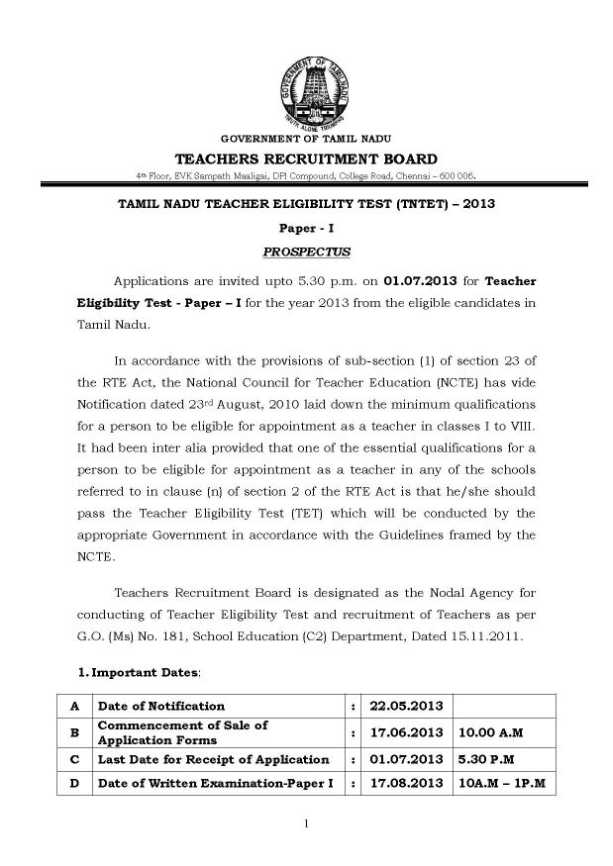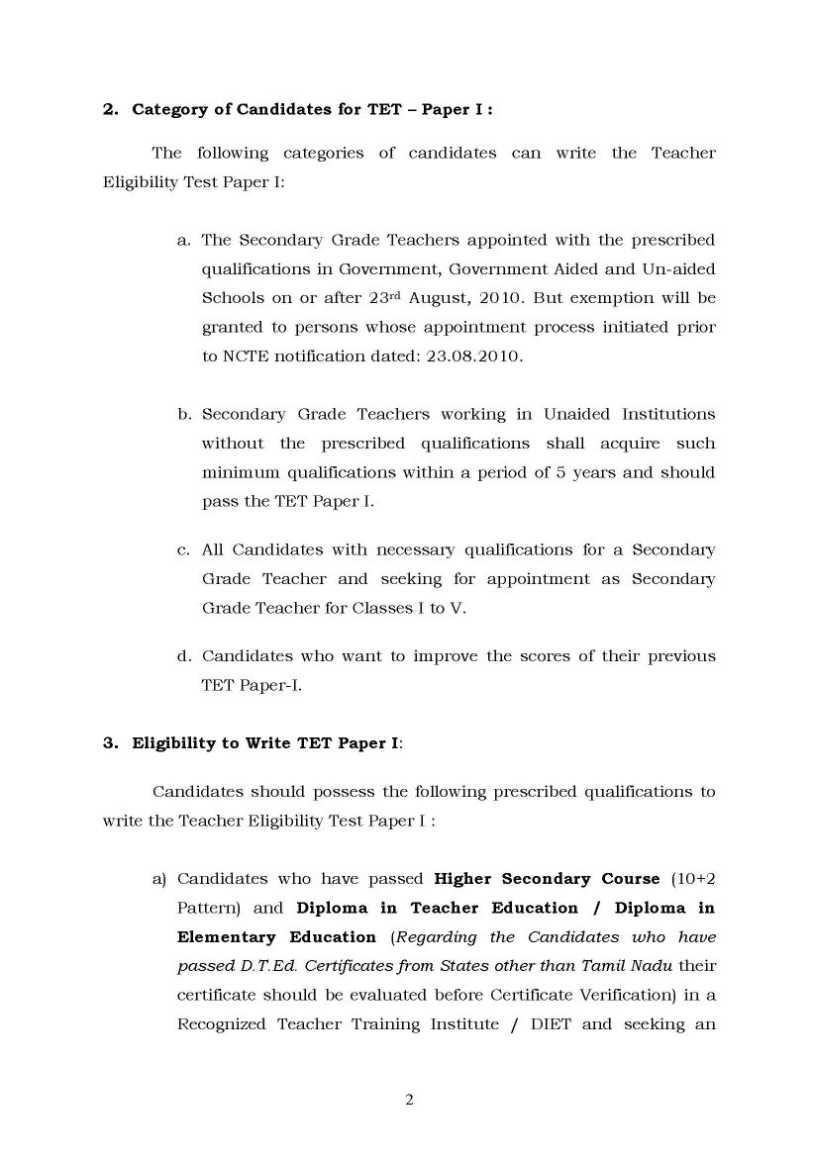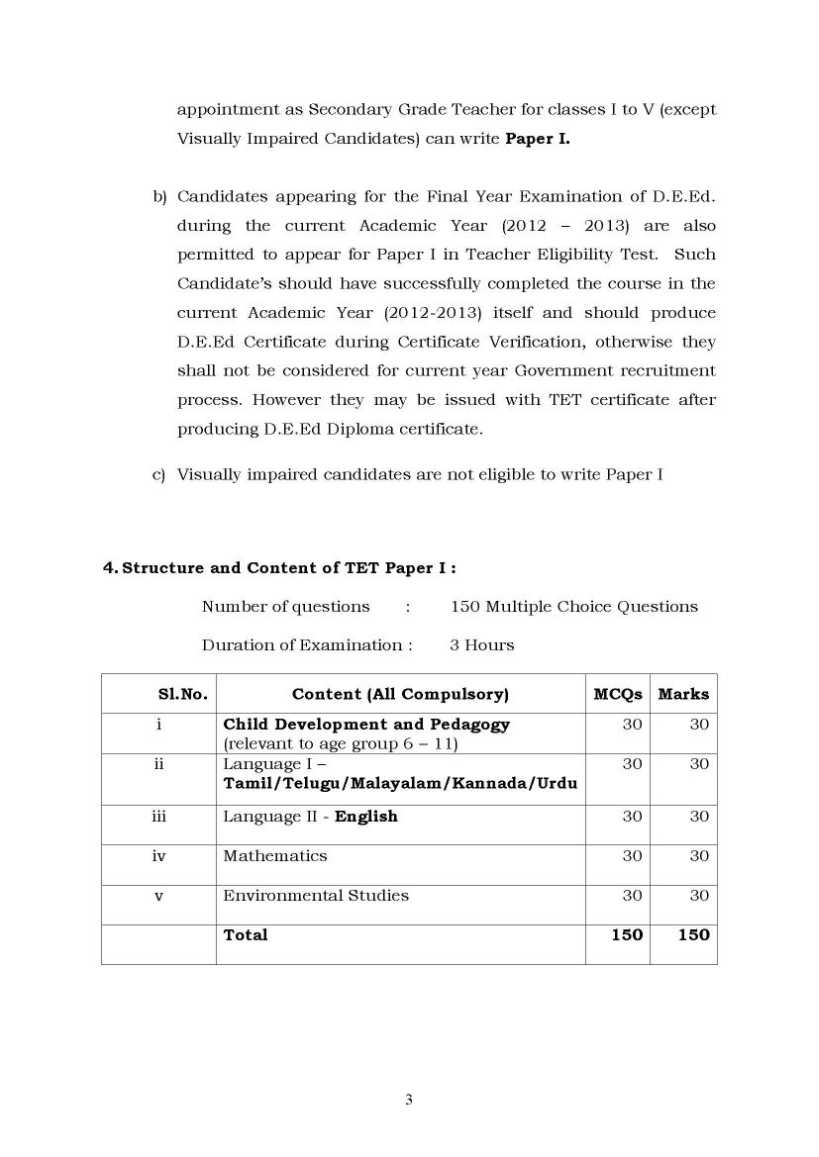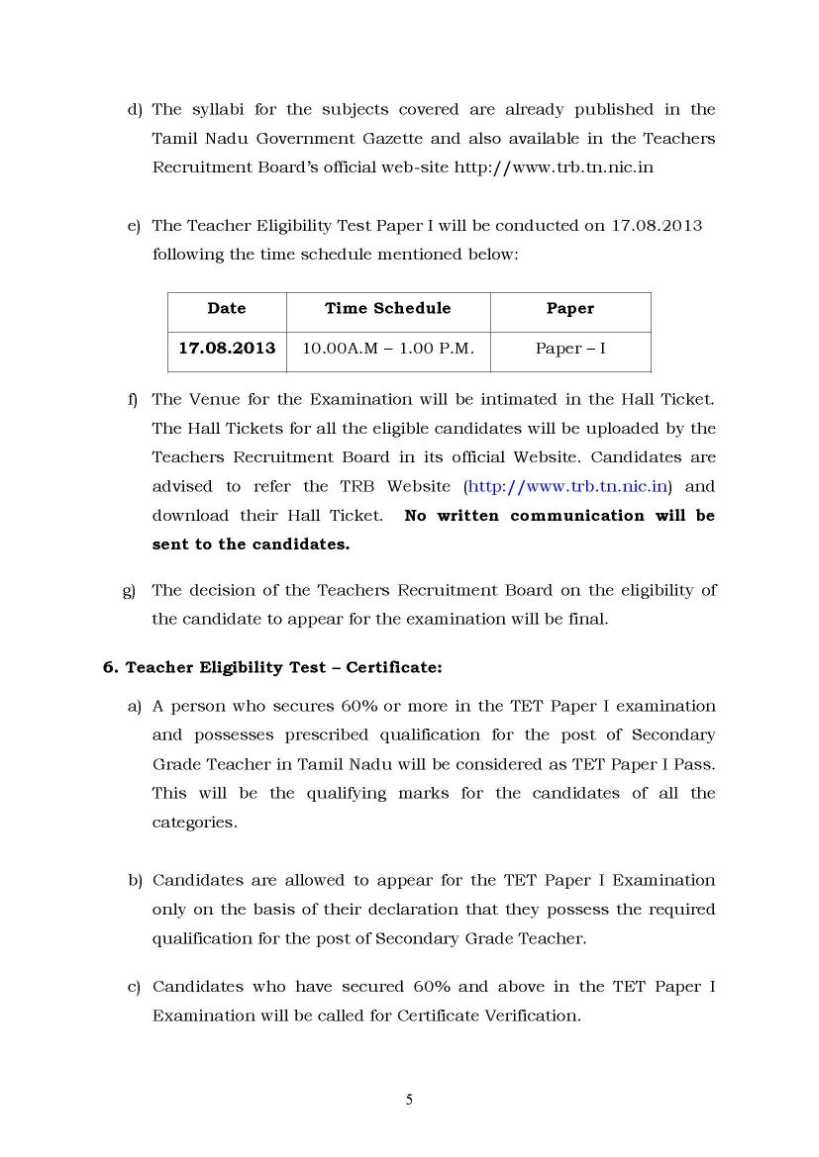| Re: TRB Exam Date
Here I am giving you the details of the Teachers Recruitment Board (TRB) Tamilnadu, Chennai recruitment exam:
Eligibility:
The applicant should hold A First Class Bachelor’s Degree in the Branch of Engineering relating to the Post Concerned from any recognized university of India, The selection process has following three stages:
Written Exam
Certificate Verification
Personal Interview
Important dates:
Notice No-04/2014
Announcement Date - 14.02.2014
Last Date to Apply -12.03.2014 -
Age Limit - No
Exam Date -08.06.2014
Age Limit
Candidates should not have completed 57 years both for Engineering and Non-Engineering Subjects.
Syllabus - Teachers Recruitment Board
Unit 1: Engineering Mathematics
Linear Algebra: Matrix algebra, Systems of linear equations, Eigen values and
eigenvectors.
Calculus: Functions of single variable, Limit, continuity and differentiability, Mean
value theorems, Evaluation of definite and improper integrals, Partial derivatives,
Total derivative, Maxima and minima, Gradient, Divergence and Curl, Vector
Identities, Directional derivatives, Line, Surface and Volume integrals, Stokes, Gauss
and Green’s theorems.
Differential equations: First order equations ( linear and nonlinear), Higher order
linear differential equations with constant coefficients, Cauchy’s and Euler’s
equations, Initial and boundary value problems, Laplace transforms, Solutions of one
dimensional heat and wave equations and Laplace equation.
Complex variables: Analytic functions, Cauchy’s Integral theorem, Taylor and
Laurent series.
Probability and Statistics: Definitions of probability and sampling theorems,
Conditional probability, Mean, median, mode and standard deviation, Random
variables, Poisson, Normal and Binomial distributions.
Numerical Methods: Numerical solutions of linear and non-linear algebraic equations
Integration by trapezoidal and Simpson’s rule, single and multi-step methods for
differential equations.
Unit 2: Mechanics
Bending moment and shear force in statically determinate beams. Simple stress and
strain relationship; Stress and strain in two dimensions, principal stresses, stress
transformation, Mohr’s circle. Simple bending theory, flexural and shear stresses,
unsymmetrical bending, shear centre. Thin walled pressure vessels, uniform torsion,
buckling of column, combined and direct bending stresses.
Unit 3: Structural Analysis
Analysis of statically determinate trusses, arches, beams, cables and frames,
displacements in statically determinate structures and analysis of statically
indeterminate structures by force/energy methods, analysis by displacement
methods (slope deflection and moment distribution methods), influence lines for
determinate and indeterminate structures. Basic concepts of matrix methods of
structural analysis.
Unit 4: Concrete Structures
Concrete Technology- properties of concrete, basics of mix design. Concrete
design-basic working stress and limit state design concepts, analysis of ultimate load
capacity and design of members subjected to flexure, shear, compression and
torsion by limit state methods. Basic elements of prestressed concrete, analysis of
beam sections at transfer and service loads.
Unit 5: Steel Structures
Analysis and design of tension and compression members, beams and beamcolumns,
column bases. Connections-simple and eccentric, beam-column
connections, plate girders and trusses. Plastic analysis of beams and frames.
Unit 6: Soil Mechanics
Origin of soils, soil classification, three-phase system, fundamental definitions,
relationship and interrelationships, permeability and seepage, effective stress
principle, consolidation, compaction, shear strength.
Unit 7: Foundation Engineering
Sub-surface investigations- scope, drilling bore holes, sampling, penetration tests,
plate load test. Earth pressure theories, effect of water table, layered soils. Stability
of slopes-infinite slopes, finite slopes. Foundation types-foundation design
requirements. Shallow foundations-bearing capacity, effect of shape, water table and
other factors, stress distribution, settlement analysis in sands and clays. Deep
foundations-pile types, dynamic and static formulae, load capacity of piles in sands
and clays, negative skin friction.
Unit 8: Fluid Mechanics and Hydraulics:
Properties of fluids, principle of conservation of mass, momentum, energy and
corresponding equations, potential flow, applications of momentum and Bernoulli’s
equation, laminar and turbulent flow, flow in pipes, pipe networks. Concept of
boundary layer and its growth. Uniform flow, critical flow and gradually varied flow in
channels, specific energy concept, hydraulic jump. Forces on immersed bodies, flow
measurements in channels, tanks and pipes. Dimensional analysis and hydraulic
modeling. Kinematics of flow, velocity triangles and specific speed of pumps and
turbines.
Hydrology: Hydrologic cycle, rainfall, evaporation, infiltration, stage discharge
relationships, unit hydrographs, flood estimation, reservoir capacity, reservoir and
channel routing. Well hydraulics.
Irrigation: Duty, delta, estimation of evapo-transpiration. Crop water requirements.
Design of: lined and unlined canals, waterways, head works, gravity dams and
spillways. Design of weirs on permeable foundation. Types of irrigation system,
irrigation methods. Water logging and drainage, sodic soils.
Unit 9: Water requirements
Quality standards, basic unit processes and operations for water treatment. Drinking
water standards, water requirements, basic unit operations and unit processes for
surface water treatment, distribution of water. Sewage and sewerage treatment,
quantity and characteristics of wastewater. Primary, secondary and tertiary treatment
of wastewater, sludge disposal, effluent discharge standards. Domestic wastewater
treatment, quantity of characteristics of domestic wastewater, primary and secondary
treatment Unit operations and unit processes of domestic wastewater, sludge
disposal.
Air Pollution: Types of pollutants, their sources and impacts, air pollution
meteorology, air pollution control, air quality standards and limits.
Municipal Solid Wastes: Characteristics, generation, collection and transportation of
solid wastes, engineered systems for solid waste management (reuse/recycle,
energy recovery, treatment and disposal).
Noise Pollution: Impacts of noise, permissible limits of noise pollution, measurement
of noise and control of noise pollution.
Unit 10: Highway Planning
Geometric design of highways, testing and specifications of paving materials, design
of flexible and rigid pavements.
Traffic Engineering: Traffic characteristics, theory of traffic flow, intersection design,
traffic signs and signal design, highway capacity.
Importance of surveying, principles and classifications, mapping concepts,
coordinate system, map projections, measurements of distance and directions,
leveling, theodolite traversing, plane table surveying, errors and adjustments, curves.
MECHANICAL ENGINEERING
Unit 1: Engineering Mathematics
Linear Algebra: Matrix algebra, Systems of linear equations, Eigen values and
eigenvectors.
Calculus: Functions of single variable, Limit, continuity and differentiability, Mean
value theorems, Evaluation of definite and improper integrals, Partial derivatives,
Total derivative, Maxima and minima, Gradient, Divergence and Curl, Vector
identities, Directional derivatives, Line, Surface and Volume integrals, Stokes, Gauss
and Green’s theorems.
Differential equations: First order equations ( linear and nonlinear), Higher order
linear differential equations with constant coefficients, Cauchy’s and Euler’s
equations, Initial and boundary value problems, Laplace transforms, Solutions of one
dimensional heat and wave equations and Laplace equation.
Complex variables: Analytic functions, Cauchy’s integral theorem, Taylor and
Laurent series.
Probability and Statistics: Definitions of probability and sampling theorems,
Conditional probability, Mean, median, mode and standard deviation, Random
variables, Poisson, Normal and Binomial distributions.
Numerical Methods: Numerical solutions of linear and non-linear algebraic equations
Integration by trapezoidal and Simpson’s rule, single and multi-step methods for
differential equations.
Unit 2: Applied Mechanics and Design
Engineering Mechanics: Free body diagrams and equilibrium; trusses and frames;
virtual work; kinematics and dynamics of particles and of rigid bodies in plane
motion, including impulse and momentum (linear and angular) and energy
formulations; impact.
Strength of Materials: Stress and strain, stress-strain relationship and elastic
constants, Mohr’s circle for plane stress and plane strain, thin cylinders; shear force
and bending moment diagrams; bending and shear stresses; deflection of beams;
torsion of circular shafts; Euler’s theory of columns; strain energy methods; thermal
stresses.
Unit 3: Theory of Machines and Vibrations
Displacement, velocity and acceleration analysis of plane mechanisms; dynamic
analysis of slider-crank mechanism; gear trains; flywheels.
Vibrations: Free and forced vibration of single degree of freedom systems; effect of
damping; vibration isolation; resonance, critical speeds of shafts.
Design: Design for static and dynamic loading; failure theories; fatigue strength and
the S-N diagram; principles of the design of machine elements such as bolted,
riveted and welded joints, shafts, spur gears, rolling and sliding contact bearings,
brakes and clutches.
Unit 4: Fluid Mechanics
Fluid Mechanics: Fluid properties; fluid statics, manometry, buoyancy; controlvolume
analysis of mass, momentum and energy; fluid acceleration; differential
equations of continuity and momentum; Bernoulli’s equation; viscous flow of
incompressible fluids; boundary layer; elementary turbulent flow; flow through pipes,
head losses in pipes, bends etc.
Unit 5: Heat-Transfer
Modes of heat transfer; one dimensional heat conduction, resistance concept,
electrical analogy, unsteady heat conduction, fins; dimensionless parameters in free
and forced convective heat transfer, various correlations for heat transfer in flow over
flat plates and through pipes; thermal boundary layer; effect of turbulence; radiative
heat transfer, black and grey surfaces, shape factors, network analysis; heat
exchanger performance, LMTD and NTU methods.
Unit 6: Thermodynamics and Applications
Zeroth, First and Second laws of thermodynamics; thermodynamic system and
processes; Carnot cycle, irreversibility and availability; behaviour of ideal and real
gases, properties of pure substances, calculation of work and heat in ideal
processes; analysis of thermodynamic cycles related to energy conversion.
Power Engineering: Steam Tables, Rankine, Brayton cycles with regeneration and
reheat. I.C. Engines: air-standard Otto, Diesel cycles. Refrigeration and airconditioning:
Vapour refrigeration cycle, heat pumps, gas refrigeration, Reverse
Brayton cycle; moist air; psychrometric chart, basic psychrometric processes.
Turbomachinery: Pelton-wheel, Francis and Kaplan turbines – impulse and reaction
principles, velocity diagrams.
Unit 7: Manufacturing Engineering
Engineering Materials: Structure and properties of engineering materials, heat
treatment, stress-strain diagrams for engineering materials.
Metal Casting: Design of patterns, moulds and cores; solidification and cooling; riser
and gating design, design considerations.
Forming: Plastic deformation and yield criteria; fundamentals of hot and cold working
processes; load estimation for bulk (forging, rolling, extrusion, drawing) and sheet
(shearing, deep drawing, bending) metal forming processes; principles of powder
metallurgy.
Joining: Physics of welding, brazing and soldering; adhesive bonding; design
considerations in welding.
Unit 8: Machining and Machine Tool Operations
Mechanics of machining, single and multi-point cutting tools, tool geometry and
materials, tool life and wear; economics of machining; principles of non-traditional
machining processes; principles of work holding, principles of design of jigs and
fixtures
Metrology and Inspection: Limits, fits and tolerances; linear and angular
measurements; comparators; gauge design; interferometry; form and finish
measurement; alignment and testing methods; tolerance analysis in manufacturing
and assembly.
Computer Integrated Manufacturing: Basic concepts of CAD/CAM and their
integration tools.
Unit 9: Production Planning and Control
Forecasting models, aggregate production planning, scheduling, materials
requirement planning.
Inventory Control: Deterministic and probabilistic models; safety stock inventory
control systems.
Unit 10: Operations Research:
SYLLABUS FOR COMPETITIVE EXAMINATION FOR
RECRUITMENT OF
ASSISTANT PROFESSORS IN GOVERNMENT ENGINEERING
COLLEGES
Linear programming, simplex and duplex method, transportation, assignment,
network flow models, simple queuing models, PERT and CPM.
Detailed syllabus is in the attachment, download it freely from here:
|





